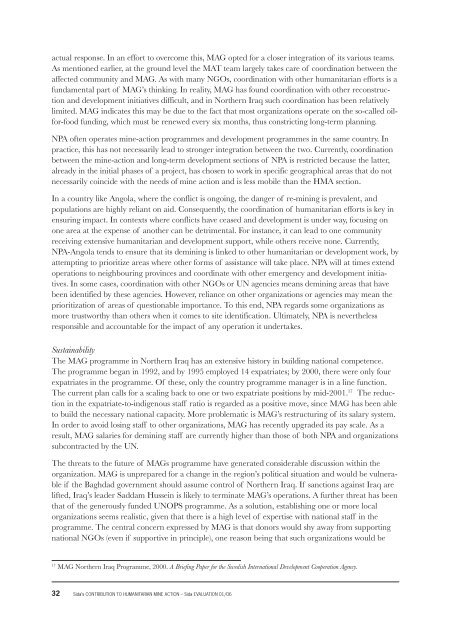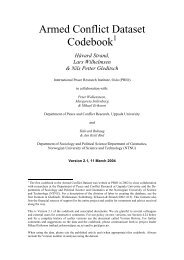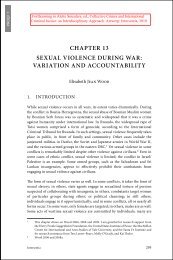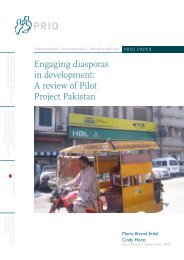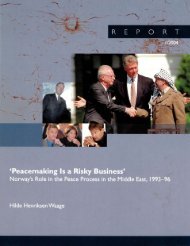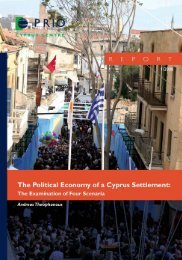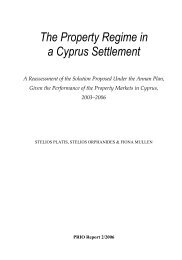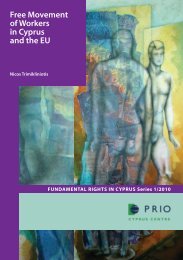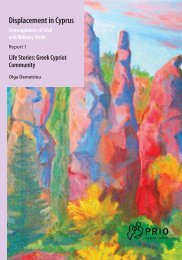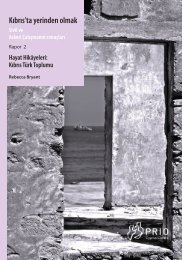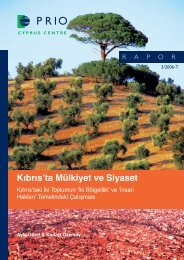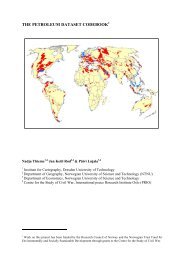actual response. In an effort <strong>to</strong> overcome this, MAG opted for a closer integration of its various teams.As mentioned earlier, at the ground level the MAT team largely takes care of coordination between theaffected community and MAG. As with many NGOs, coordination with other humanitarian efforts is afundamental part of MAG’s thinking. In reality, MAG has found coordination with other reconstructionand development initiatives difficult, and in Northern Iraq such coordination has been relativelylimited. MAG indicates this may be due <strong>to</strong> the fact that most organizations operate on the so-called oilfor-foodfunding, which must be renewed every six months, thus constricting long-term planning.NPA often operates mine-action programmes and development programmes in the same country. Inpractice, this has not necessarily lead <strong>to</strong> stronger integration between the two. Currently, coordinationbetween the mine-action and long-term development sections of NPA is restricted because the latter,already in the initial phases of a project, has chosen <strong>to</strong> work in specific geographical areas that do notnecessarily coincide with the needs of mine action and is less mobile than the HMA section.In a country like Angola, where the conflict is ongoing, the danger of re-mining is prevalent, andpopulations are highly reliant on aid. Consequently, the coordination of humanitarian efforts is key inensuring impact. In contexts where conflicts have ceased and development is under way, focusing onone area at the expense of another can be detrimental. For instance, it can lead <strong>to</strong> one communityreceiving extensive humanitarian and development support, while others receive none. Currently,NPA-Angola tends <strong>to</strong> ensure that its demining is linked <strong>to</strong> other humanitarian or development work, byattempting <strong>to</strong> prioritize areas where other forms of assistance will take place. NPA will at times extendoperations <strong>to</strong> neighbouring provinces and coordinate with other emergency and development initiatives.In some cases, coordination with other NGOs or UN agencies means demining areas that havebeen identified by these agencies. However, reliance on other organizations or agencies may mean theprioritization of areas of questionable importance. To this end, NPA regards some organizations asmore trustworthy than others when it comes <strong>to</strong> site identification. Ultimately, NPA is neverthelessresponsible and accountable for the impact of any operation it undertakes.SustainabilityThe MAG programme in Northern Iraq has an extensive his<strong>to</strong>ry in building national competence.The programme began in 1992, and by 1995 employed 14 expatriates; by 2000, there were only fourexpatriates in the programme. Of these, only the country programme manager is in a line function.The current plan calls for a scaling back <strong>to</strong> one or two expatriate positions by mid-2001. 17 The reductionin the expatriate-<strong>to</strong>-indigenous staff ratio is regarded as a positive move, since MAG has been able<strong>to</strong> build the necessary national capacity. More problematic is MAG’s restructuring of its salary system.In order <strong>to</strong> avoid losing staff <strong>to</strong> other organizations, MAG has recently upgraded its pay scale. As aresult, MAG salaries for demining staff are currently higher than those of both NPA and organizationssubcontracted by the UN.The threats <strong>to</strong> the future of MAGs programme have generated considerable discussion within theorganization. MAG is unprepared for a change in the region’s political situation and would be vulnerableif the Baghdad government should assume control of Northern Iraq. If sanctions against Iraq arelifted, Iraq’s leader Saddam Hussein is likely <strong>to</strong> terminate MAG’s operations. A further threat has beenthat of the generously funded UNOPS programme. As a solution, establishing one or more localorganizations seems realistic, given that there is a high level of expertise with national staff in theprogramme. The central concern expressed by MAG is that donors would shy away from supportingnational NGOs (even if supportive in principle), one reason being that such organizations would be17MAG Northern Iraq Programme, 2000. A Briefing Paper for the Swedish International Development Cooperation Agency.32 Sida’s CONTRIBUTION TO HUMANITARIAN MINE ACTION – Sida EVALUATION 01/06
more vulnerable <strong>to</strong> political pressure from the parties involved in the conflict. 18 While this is a validconcern, there are ways of circumnavigating such a dilemma. One possibility is a type of MAG umbrellafunction, which could include fundraising, quality assurance and even work as a political shield.Alternately, national NGOs could find an arrangement with the UN. As of November 2000, MAGhad not decided on an exit strategy, something that may stem from a reluctance <strong>to</strong> let go of one of theorganization’s most successful programmes. Since, MAG has confirmed that it has established plans forwithdrawal from the region.In Angola, the issue of capacity building is a key question. To this end, one concern is whether or notNPA has been successful in building a long-term capacity. On the one hand, NPA could choose <strong>to</strong> stayin Angola on a semi-permanent basis. On the other, the possibility of building national organizations<strong>to</strong> take over from NPA could be explored. Currently, transferring the capacity <strong>to</strong> the government is notan option, primarily because Institu<strong>to</strong> Nacional de Remoção De Obstáculos E Engenhos Explosivos(INAROEE) has been highly unsuccessful both in coordinating HMA and in an operative capacity.Moreover, INAROEE’s demining capacity has not been operational since 1999. INAROEE wishes <strong>to</strong>be able <strong>to</strong> reactivate their former demining capacity, but this is unlikely <strong>to</strong> materialize. First, because ithas long been realized that national coordinating bodies are unable <strong>to</strong> perform their duties appropriatelywhen they also have an operational wing (see section on the UN). Second, because the Angolangovernment is currently laying mines, and hence a national demining capacity funded by donor aidmay be seen as an additional war-making <strong>to</strong>ol. At this time, it appears that NPA does not have a clearexit strategy, nor does it have a long-term strategy for continuing its operations. NPA has tried <strong>to</strong>nationalize its programme as much as possible. Currently, NPA hopes that regional offices will bemostly indigenous by the end of 2001. One positive step taken in this regard has been <strong>to</strong> hire anexpatriate whose role is solely <strong>to</strong> build the management competence of national staff. These measuresare regarded as positive steps.AccountabilityWith its <strong>Mine</strong> <strong>Action</strong> Teams, MAG has developed a strong level of accountability <strong>to</strong> the mine-affectedlocal population. This is exemplified both by the way in which information is collected on impact andby the way communities are given significant influence over the selection of tasks affecting a particularcommunity. Of particular importance is the emphasis on the ’community liaison’ function, which ismeant <strong>to</strong> ensure regular contact with locals throughout the implementation phase, and hence is anasset also in building confidence in clearance. MAG’s level of reporting <strong>to</strong> existing authorities has beenrelatively low. Over the past year, stronger relationships have been developed with the two locally basedadministrations. This is partly a matter of necessity, since both relevant administrations have establishedtheir own mine-action offices. There is a potential conflict between MAG’s emphasis on community-levelaccountability and the emergence of stronger mine-action offices, at least if the latter usetheir new capacity <strong>to</strong> direct priority-setting for political reasons. At the moment, MAG, in cooperationwith other agencies in the region, engages in low-key capacity-building with both offices. When Sidaconducted its capacity study in 1998, significant delays in financial reporting was seen as one problem.It appears that MAG has since rectified this problem. A different problem with regard <strong>to</strong> accountability<strong>to</strong> donors is that access <strong>to</strong> Northern Iraq has proved difficult, and, as a result, there have been fewproject visits. Given Sida’s extensive engagement with the programme, and particularly given theinnovative aspects of the programme, a fuller evaluation would be advisable.NPA’s consultation with target groups has, until recently, been low owing <strong>to</strong> the absence of an impactassessmentsystem. However, it is hoped that this will change with the use of the <strong>to</strong>ols that have been18Additionally, there is concern that technical standards may be lowered.Sida’s CONTRIBUTION TO HUMANITARIAN MINE ACTION – Sida EVALUATION 01/06 33
- Page 4: This report is part of Sida Evaluat
- Page 9 and 10: MDDMEDDSMGMMLSWMoPHMOUMPLANATONDING
- Page 12 and 13: the conclusions of this report is t
- Page 14 and 15: A prime concern with Mine Action Ce
- Page 16 and 17: 3. The coordination of mine action,
- Page 18 and 19: an needs and the needs of victims o
- Page 20 and 21: At the same time as Sida has been o
- Page 22 and 23: er, throughout the data collection,
- Page 24 and 25: Donors may feel that the costs of i
- Page 26 and 27: is genuinely new. 8 At an overall l
- Page 28 and 29: The first attempt to apply a form o
- Page 30 and 31: standard for basic impact surveys.
- Page 32 and 33: Community studiesCommunity studies
- Page 34 and 35: and progress monitored in all phase
- Page 36 and 37: 3 Implementation ChannelsOver the p
- Page 38 and 39: cal implementation and management,
- Page 40 and 41: ing that demining has any effect at
- Page 44 and 45: ecently developed. The approaches t
- Page 46 and 47: A different tool that will be used
- Page 48 and 49: Alternative implementation channels
- Page 50 and 51: appear to have been doing a good jo
- Page 52 and 53: Coordination may at times even be c
- Page 54 and 55: itarian and development effort. Imp
- Page 56 and 57: Two). In terms of coordinating mine
- Page 58 and 59: ased demining of AREA. Another type
- Page 60 and 61: The Kosovo UNMACC took a number of
- Page 62 and 63: would be accredited and tasked by U
- Page 64 and 65: programme. The proposal was backed
- Page 66 and 67: The present landscape of Swedish ac
- Page 68 and 69: demining purposes. Buoyed by a wave
- Page 70 and 71: given that SRSA also recruits perso
- Page 72 and 73: teams. The need for a breeding capa
- Page 74 and 75: 6 RecommendationsIn the preceding c
- Page 76 and 77: • MACs should operate with agreem
- Page 78 and 79: 7 ConclusionIn this report, we have
- Page 80: 70Appendix 1
- Page 89 and 90: Ziauddin Operations Officer METADup
- Page 91 and 92: Bennedich, Claes Department for eva
- Page 93 and 94:
Appendix 3BIBLIOGRAPHYAccelerated D
- Page 95 and 96:
Faulkner, F. & L Pettiford, 1998.
- Page 97 and 98:
McGrath, Rae, 2000. Landmines and U
- Page 99 and 100:
Miscellaneous DocumentsBrady, Justi
- Page 101 and 102:
Appendix 4Sida’s CONTRIBUTION TO
- Page 103 and 104:
Appendix 6• The area must be secu
- Page 105 and 106:
Appendix 7Locality identifier: Dist
- Page 107:
Recent Sida Evaluations00/37:1 Asse


